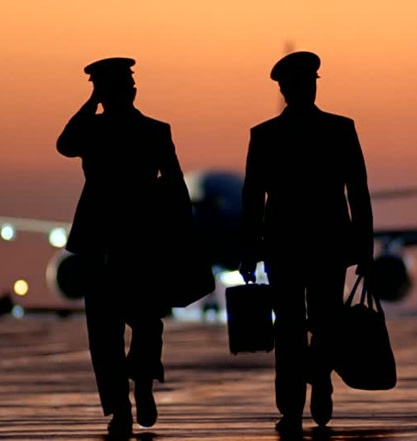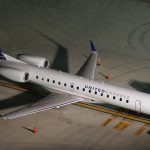Rise of Amazon Air and Its Impact On Cargo Pilot Jobs
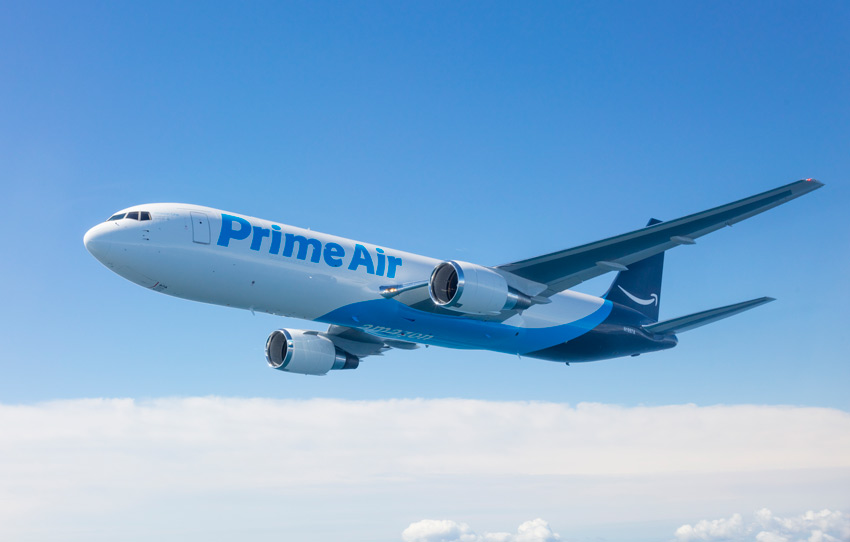
Amazon began experimental air cargo operations in late 2015. The company later moved beyond experimenting and started operations in the spring of 2016 with 20 Boeing 767s operated by Air Transport International.
Amazon’s foray into air cargo operations has begun to have a noticeable impact on the air cargo industry and may start to alter the cargo pilot job market. Learn what this means for pilots seeking careers in cargo jet operations.
Amazon Air Operations
A couple years after beginning operations and Amazon Air is continuing to outsource all flying to other companies. The contractors include Atlas Air Worldwide and the Air Transport Services Group. Both aviation groups provide dedicated 767s painted in Amazon Air livery.
Atlas Air

Atlas Air Worldwide is the parent company that owns Atlas Air, Polar Air, Southern Air, as well as other companies providing support to air cargo operations. Amazon has options to purchase up to 20% of Atlas Air Worldwide’s stock.
The Atlas Air subsidiary is the operator of the 767s being flown on behalf of Amazon Air – the company will have 20 of the airplanes in service by the end of 2018.
Atlas Air Pilot Jobs
Atlas Air has job listings for first officers to be hired into flying either Boeing 767s or Boeing 747s. The company lists the following requirements to apply to the position:
- Hold an unrestricted ATP certificate with multi-engine class rating and English proficiency endorsement
- Hold a current FAA First Class Medical Certificate
- Hold an FCC Restricted Radiotelephone Operator Permit
- Have a passport with no restrictions on international travel
- Legally authorized to work in the United States
- At least 1500 hours of total flight time
- At least 500 hours of turbine time
- At least 1000 fixed wing or 500 hours with a 121 carrier
- At least 23 years old
- The company prefers pilots to be current & qualified and operating in a part 121, 135 or part 91 environment
Air Transport International (ATI)
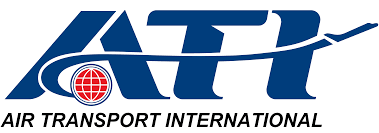
Air Transport Services Group is the parent company that owns Air Transport International (ATI), ABX Air, Omni Air International, as well as several other companies providing air cargo operations support. Amazon has options to purchase up to 19.9% of Air Transport Services Group’s stock.
The Air Transport International subsidiary is the operator of the 767s being flown on behalf of Amazon Air. They were the launch company for Amazon Air operations and currently fly 20 767s on Amazon’s behalf.
Air Transport International Pilot Jobs
Air Transport International does not list current pilot job openings on their website. They use application window periods that are common with legacy passenger airlines and will announce the window periods when pilots can apply. They will then pull from the pool as necessary to staff their operations outside of the window. The company typically includes minimum pilot qualification requirements necessary to apply when they announce the window opening.
Amazon Air Pilot Pay
As mentioned above, pilots flying Amazon Air branded airplanes work for either Air Transport International or Atlas Air. The chart below includes pay for flying 767s at these two carriers as well as the equivalent pay at Fedex and UPS.
How pilot pay is determined can be confusing. However, a good rule of thumb is to multiply the hourly rate by 1,000 to get an estimate on annual earnings.
The table shows Captain positions (CA) and first officer positions (FO). Each employer in this table will start new hire pilots in first officer positions. Be mindful that captain upgrade time between the employers will vary with some having longer upgrade times and pilots spending more time getting paid off the first officer scale. Additionally, some of the carriers have options to fly other airplane types that have different pay scales.
Cargo Pilot Boeing 767 Hourly Pay
| Year | Atlas Air (CA) | Atlas Air (FO) | ATI (CA) | ATI (FO) | Fedex (CA) | Fedex (FO) | UPS (CA) | UPS (FO) |
|---|---|---|---|---|---|---|---|---|
| 15 | – | – | – | – | 313 | 222 | 309 | 219 |
| 14 | – | – | – | – | 310 | 220 | 305 | 217 |
| 13 | – | – | – | – | 307 | 219 | 302 | 216 |
| 12 | 179 | 125 | 246 | 166 | 305 | 218 | 300 | 215 |
| 11 | 174 | 122 | 241 | 163 | 301 | 212 | 297 | 209 |
| 10 | 169 | 118 | 235 | 160 | 298 | 207 | 293 | 203 |
| 9 | 164 | 114 | 229 | 156 | 295 | 201 | 290 | 198 |
| 8 | 159 | 111 | 223 | 152 | 293 | 197 | 289 | 194 |
| 7 | 154 | 108 | 217 | 147 | 292 | 193 | 288 | 190 |
| 6 | 150 | 103 | 211 | 143 | 291 | 189 | 287 | 186 |
| 5 | 146 | 98 | 205 | 139 | 290 | 186 | 285 | 183 |
| 4 | 141 | 93 | 197 | 134 | 289 | 182 | 284 | 179 |
| 3 | 137 | 89 | 191 | 130 | 288 | 178 | 283 | 175 |
| 2 | 133 | 84 | 165 | 112 | 287 | 178 | 283 | 175 |
| 1 | 129 | 80 | 129 | 76 | 258 | 79 | 46 | 46 |
Atlas Air captain upgrade time: 2.5 years
Air Transport International captain upgrade time: 2.5 years
Fedex captain upgrade time: 2 years
UPS captain upgrade time: 13 years
Atlas Air Pilot Discontent
Pilots at Atlas Air are increasingly expressing their discontent with working conditions at the carrier. They say the cargo airline is not paying enough to remain competitive in the pilot employment landscape and that the Atlas Air is thus not able to maintain adequate pilot staffing for their operations.
Captain Robert Kirchner, Atlas pilot and executive council chairman of Teamsters Local 1224, said that about 100 pilots quit Atlas in 2015 with that number jumping to 198 in 2017. Kirchner estimates that up to 300 pilots would quit in 2018.
“They tried to hire 379 pilots in 2018,” Kirchner said. “They only got 285 to show up to class, which is unheard-of in the industry.”
Teamsters Local 1224, which represents pilots at Atlas Air, conducted a survey in 2018 to see how Atlas Air pilots felt about their jobs. The survey found that 60% planned to leave Atlas Air.
The survey asked whether the pilots felt morale was high at the airline and 76% of Atlas pilots said that it was not.
In the survey, 65% of pilots said they had been asked by the company to work on their days off. Kirchner said pilots at Atlas accrue less paid time off than pilots at other cargo carriers.
A spokesman from Atlas Air countered that the the company valued the pilots’ rights to express their opinions but that “The commentary from the pilot union, however, is part of an overall campaign to put public pressure on the company with respect to our next labor contract. The union’s campaign has included the dissemination of false and/or misleading statements.”
Amazon Air Growth Plans
Amazon Air looks unlikely to stay at 40 airplanes for long. There is already reports that the company has put out a request for proposal for 6 additional wide body freighters. Analysts are saying the market is tight on acquiring additional 767 freighters and that the request may need to be filled with larger Airbus A330 freighters.
There are unsubstantiated rumors that Amazon is looking to grow beyond 100 airplanes.
Air Cargo Hubs
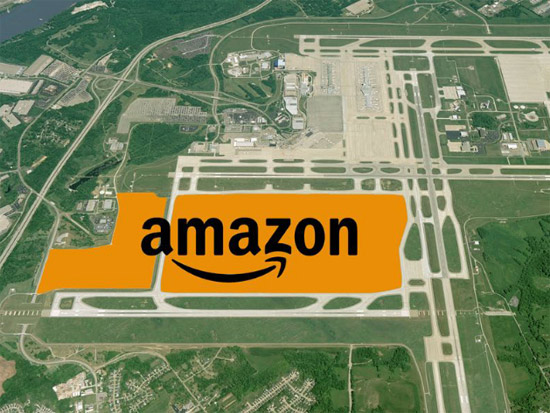
In addition to establishing an airplane fleet Amazon has begun developing air cargo hubs. Amazon has leased more than 900 acres of land near the Cincinnati/Northern Kentucky International Airport (CVG) and is investing $1.5 billion in developing the land into a cargo operations center.
The Cincinnati hub will have parking for 100 airplanes and will employee 2,700 in the sort facility and airplane support.
Amazon has also announced that they will build out a regional cargo hub at Fort Worth’s Alliance Airport.
What Amazon Growth Means for Existing Cargo Airlines
“The market is missing the risk Amazon Air poses to UPS/FDX growth,” a group of Morgan Stanley analysts recently said.
“Though Amazon Air’s rollout is in the early innings, we estimate a 200-300 bps impact on UPS and FedEx Domestic Air Volume growth already, with more erosion expected as Amazon Air is built out,” said Ravi Shanker, an analyst with Morgan Stanley. “We also estimate that Amazon Air’s lanes overlap with over two thirds of the volume flown by UPS+FedEx combined.”
Estimates are that UPS and FedEx revenues could fall 2% in 2018 and that this loss may increase to 10% by 2025.
Morgan Stanley’s report continued “While this is hardly crippling to UPS/FedEx as US domestic air/express only accounts for ~17% and 19% of total revenues respectively, it is enough to serve as a drag on earnings growth, especially in combination with other areas of secular competitive pressure. The drag will likely grow as Amazon Air grows its fleet, expands operations and potentially starts moving third party volumes.”
Greg started his professional pilot journey in 2002 after graduating from Embry Riddle. Since that time he has accumulated over 8,000 hours working as a pilot. Greg’s professional experience includes flight instructing, animal tracking, backcountry flying, forest firefighting, passenger charter, part 135 cargo, flying for a regional airline, a national low cost airline, a legacy airline, and also working as a manager in charge of Part 135 and Part 121 training programs.

